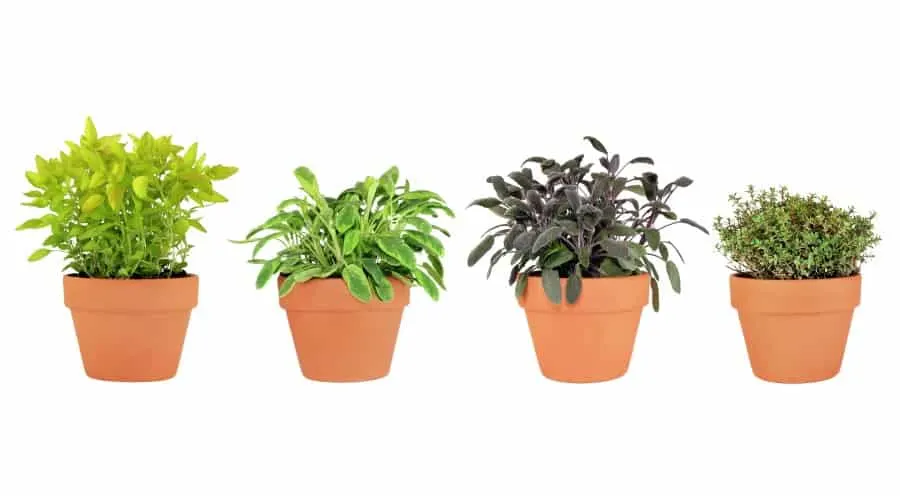Growing herbs may appear to be a simple and straightforward process, but if you don’t get the small details correct, it could have a profound impact on the plant’s growth and development. The most important detail you shouldn’t overlook is the type of soil that you grow your herbs in.
The best type of soil for herbs is potting soil that is light, dry, and contains good drainage properties. It’s best to avoid wet, heavy soils like flower and garden soils. Before planting herbs, place pebbles on the bottom to provide extra drainage.
In this article we will highlight the best soil for growing herbs as well as how to properly prepare the soil for your herbs.

What is the Best Soil for Herbs?
Good herb soil, regardless of the brand you are using, must have good drainage. In other words, any soil that holds water without allowing it to drain and flow through adequately will cause your herbs to suffer in quality. Because you want to avoid water retention in the soil you are using for your herbs, materials like clay and sand may pose a problem for their development.
One method that experienced gardeners often use is digging down beneath the topsoil and laying some small rocks or pebbles below the spot where the herbs will be planted, which will provide some gaps that help drain water better.
Most herbs do not require a lot of nutrients to grow. You can give them a little compost mixture occasionally to provide some added nutrition, but compost holds a lot of water and can inhibit drainage. The best type of soil for herbs will be a general-purpose potting soil, which is dry, relatively low in nutrients, and drains well.
Consider how the growing environment may impact the dampness of your soil. If you are growing herbs indoors, they will not be subject to the elements, such as rain and intense UV light. The environment will be much more controlled, as will the wetness of the soil.
If, on the other hand, you are growing outside, you will have to account for the unpredictability of nature.
One of the last things to consider is shade. Shade makes soil retain much more water as it is not as easily able to evaporate. If your herb garden is in a shady location, consider moving it if possible. If this is not an option, water them less frequently.
If you want a suitable soil that is dry and well-suited for herb growing, go with a reputable brand of potting soil. The product we recommend for planting your herbs is the FoxFarm Ocean Forest Potting Soil. This soil is perfectly mixed to provide your herbs with everything they need to grow healthy.
Some other types of soil which are known for having good drainage are loam and sandy soil. Both of these are loose, dry, and relatively low in nutrients. This makes them perfect candidates for growing healthy herbs.

Do All Herbs Do Well in Similar Soils?
Will this kind of potting soil be appropriate for all herbs or only some? Some herbs might be more water tolerant than others and require more or fewer nutrients. Some herbs, such as lavender and rosemary, demand efficient drainage, while others like chives can handle a wetter soil with higher nutrients.
However, all herbs will do well if the principles of water retention prevention are closely adhered to. Finding out what works will require some degree of trial and error and takes a bit of personal, hands-on experience. It’s always best to do research on the specific herb you’re planning to grow, to make sure you provide the best possible environment for it to thrive.
Can You Use Flower Soil for Herbs?
Flower soil is not suitable for growing herbs, as it is heavy, nutrient-dense, and retains a lot of water for long periods of time, which is the opposite of what you should be looking for in good herb soil.
While dense, wet soils are great for flower beds and growing flowers, they will produce extremely poor herbs. Flower soil has many great uses and is a potent soil that many plants thrive on, but herbs will not appreciate it.
You should not only avoid flower soil, but all types of soil that are dense and heavy when it comes to growing herbs. Soils that bind together tightly and retain a lot of moisture and humidity are a no-go. Other types of soils to avoid when planting herbs are silt and clay soils.
How Should You Prepare the Soil for Herbs?
Failure to properly prepare the soil before you plant your herbs might lead to unhealthy plants.
Although there might be slightly different soil preparation methods depending on whether you are potting your herbs or planting them directly into the ground, the goal will be the same: accommodate for proper drainage.
To prepare your soil for planting herbs, dig into the soil below where you will be planting, and place a layer of pebble stones underneath, which is the best way to increase drainage. Do not replace the stones with sand, moss, or anything else of that nature as it will hold water and defeat the purpose.
Commercial pebble stones work slightly better than natural stones. Many commercially purchased pebble stones are glossy and coated on the outside, allowing water to run through them very easily.
The next step is to pour your potting soil into the hole and mix it well with a hand trowel, which will help you churn the soil and prevent it from getting clumpy and soggy.
Finally, sprinkle some fertilizer along the soil’s surface. Again, be very sparing with how much you use as you do not want to add moisture or humidity to your dirt.
Never use moss around your herbs as its spongy consistency holds a lot of moisture and will hinder your herbs’ development.
If you are planting herbs in a pot, make sure that it has large holes in the bottom to allow water to flow out. If you are using a pot that does not have holes in the bottom, you must either make some with a drill gun or find a different pot.
Closing Thoughts
When considering what soil to use for your herb garden it’s best to consider a well-draining, loamy soil that has a neutral pH level.
Here are Some of my Favorite Gardening Products and Tools
Thank you for reading this article. I hope you found it helpful for growing some new plants in your home or garden. Here are some products I like that I hope you’ll also find helpful. These are affiliate links, and I am compensated for referring traffic. But in all honesty, these are the exact product that I use or recommend to everyone.
Soil: For high-quality soil, I really like Fox Farm Ocean Forest. I do all my growing in containers and this soil has worked great for me. I like how they use nutrient-rich contents like earthworm castings, bat guano, and composted crab and fish.
Fertilizer: Currently I am using a seaweed-based organic fertilizer call Neptunes Harvest. This is a great milder fertilizer option if you want to use something organic. If you want a more powerful fertilizer, I recommend Fox Farm Liquid Nutrient Trio, lots of people have had great growing success with this product.
Pruning Shears: Pruning shears are one of the most useful gardening tools to have because it’s important to prune your plants to keep them healthy. The pruning shears I recommend are the Gonicc 8’’ pruning shears. I like them because they are built sturdy and work both on bigger and smaller plants, so you don’t need to have multiple pruning shears.
spicytrio.com is a participant in the Amazon Services LLC Associates Program, an affiliate advertising program designed to provide a means for sites to earn advertising fees by advertising and linking to Amazon.com. spicytrio.com also participates in affiliate programs with other sites. spicytrio.com is compensated for referring traffic and business to these companies.
